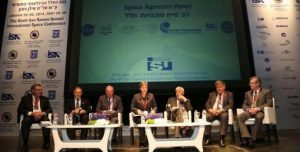
Ian Christensen, Project Manager at the Secure World Foundation, reports for SpaceWatch Middle East, on the 12th Annual Ilan Ramon International Space Conference held in Herzilya, Israel, on 30-31 January 2017.
The 12th Annual Ilan Ramon International Space Conference was held in Herzilya, Israel on 30-31 January 2017. Organized by the Israeli Ministry of Science, Space and Technology, the Israel Space Agency (ISA), and The Fisher Brothers Institute for Air and Space Strategic Studies, the conference is held annually to commemorate Israeli astronaut Colonel Ilan Ramon, a crewmember on the tragic STS-107 Space Shuttle Columbia mission. The conference features cross disciplinary discussion of civil, commercial, and national security space activities. It attracts high-level participation from both government and industry from across the globe, including from the United States, Europe, and Israel.
A major recurring theme of the discussion during the 2017 conference was the role international partnerships and cooperation play in the development and execution of space projects. After an opening ceremony in memorial to the STS-107 crew, the conference began with a focused session on space science developments in 2016. As an example of public-private partnerships in space exploration, Pete Worden of the Breakthrough Prize Foundation highlighted the Foundation’s efforts, through its Breakthrough Starshot Project, to develop a scientific mission to the Alpha Centauri star system. Using the example of Luxembourg, he also discussed how governments are working in collaboration with industry to develop asteroid mining and space resources development capabilities.
The presentations on space science developments were followed by a Heads of Agencies panel, focusing on space exploration activities. This panel included: Jan Woerner, Director General of the European Space Agency (ESA); Jean-Eves Le Gall, President of the Centre National d’Etudes Spatiales (CNES); Roberto Battison, President of the Agenzia Spaziale Italiana (ASI); Tapan Misra, Director of the Indian Space Research Organisation (ISRO) Space Applications Center; Leslie Deutsch, Deputy Director for the Interplanetary Network Directorate at NASA Jet Propulsion Laboratory (JPL); and Charles Bolden, former NASA Administrator (in his personal capacity). Many of these panelists emphasized the role of international cooperation in their agency’s programs, including French-Israeli cooperation on the Vegetation and Environment monitoring on a New Micro-Satellite (VENµS) mission, which is due to launch in 2017, and Italian-Russian cooperation on a synthetic aperture radar program. Cooperation between government and industry using public-private partnerships was also a topic of this panel, in particular with regards to potential future lunar and Martian human exploration plans. Mr. Bolden summed up this theme by describing the change in the character of the global space community from the space race to an era of global collaboration. He also remarked that he believes maintaining NASA’s “more than 800” international partnerships is one of the core challenges facing NASA during the current U.S. executive branch transition.
Discussion of collaboration continued in the session dedicated to space and security, which featured presentations from both the Commander of the Israel Air Force, Major General Amir Eshel, and from the Commander of U.S. Air Force Space Command, General John Raymond. Both generals addressed the important role space infrastructure and resources play in military capabilities and in providing links between allied forces. General Raymond addressed how national security space capabilities can be leveraged as a tool to support positive norms of behavior in space operations – highlighting space situational awareness agreements as an example.
The conference also included several presentations from the Israeli and international space industry. Israeli companies included RAFAEL, Elbit Systems, ImageSat International, and Israel Aerospace Industries. These presentations highlighted current activities and looked forward to a busy year for the Israeli space industry in 2017, with the planned launch of five Israeli satellites. However, despite the optimism for 2017, a key theme of these presentations was the loss of the Israeli-built and owned Amos-6 communications satellite during the Falcon-9 launch vehicle fueling test failure in September 2016. Speakers expressed concerns for possible ripple effects on the space industrial capability base in Israel, and several argued for the Israeli government to make a policy commitment to communications satellites as national strategic capability. Returning to the theme of cooperation, industry speakers also referenced the importance of international industry to industry cooperation as a means towards building both business and resilience in a relatively small sized space industry, like that of Israel. International industry presentations included SpaceX, Virgin Galactic, Sky and Space Global (SSG), and Rocketplane Global, and consisted of updates on current technology and business plans.
The conference also included an international astronaut panel featuring five current and retired astronauts from the United States and Europe. This panel, which is one of the traditional recurring elements of the Ilan Ramon Conference, links the event both to its origins as memorial to the Columbia crew and to its objective of supporting and inspiring students interested in space. Other elements of the program also tied to the conference’s educational objectives, including awarding the memorial Ilan Ramon Scholarships and a presentation on the Israel 70 project, an initiative which aims to develop and launch 70 high school-built cube satellites to correspond with the 70th anniversary of the State of Israel.
The conference concluded with three smaller invite-only workshops: one focusing on Earth observation applications in the Mediterranean region, the second discussing the relationship between space sustainability and the increasing use of small satellites, and the third (co-organized by the Space Generation Advisory Council) looking at issues associated with big data generated from space missions.
Fitting to its purpose as a memorial to the STS-107 Columbia crew – which was itself an example of international cooperation – the 2017 Ilan Ramon International Space Conference provided a reminder of role partnerships and cooperation plays throughout the space sector.
SpaceWatch Middle East is a proud partner of the Secure World Foundation.
Original published at: http://spacewatchme.com/2017/02/twelfth-annual-ilan-ramon-international-space-conference-emphasizes-international-cooperation/
 SpaceWatch.Global An independent perspective on space
SpaceWatch.Global An independent perspective on space

